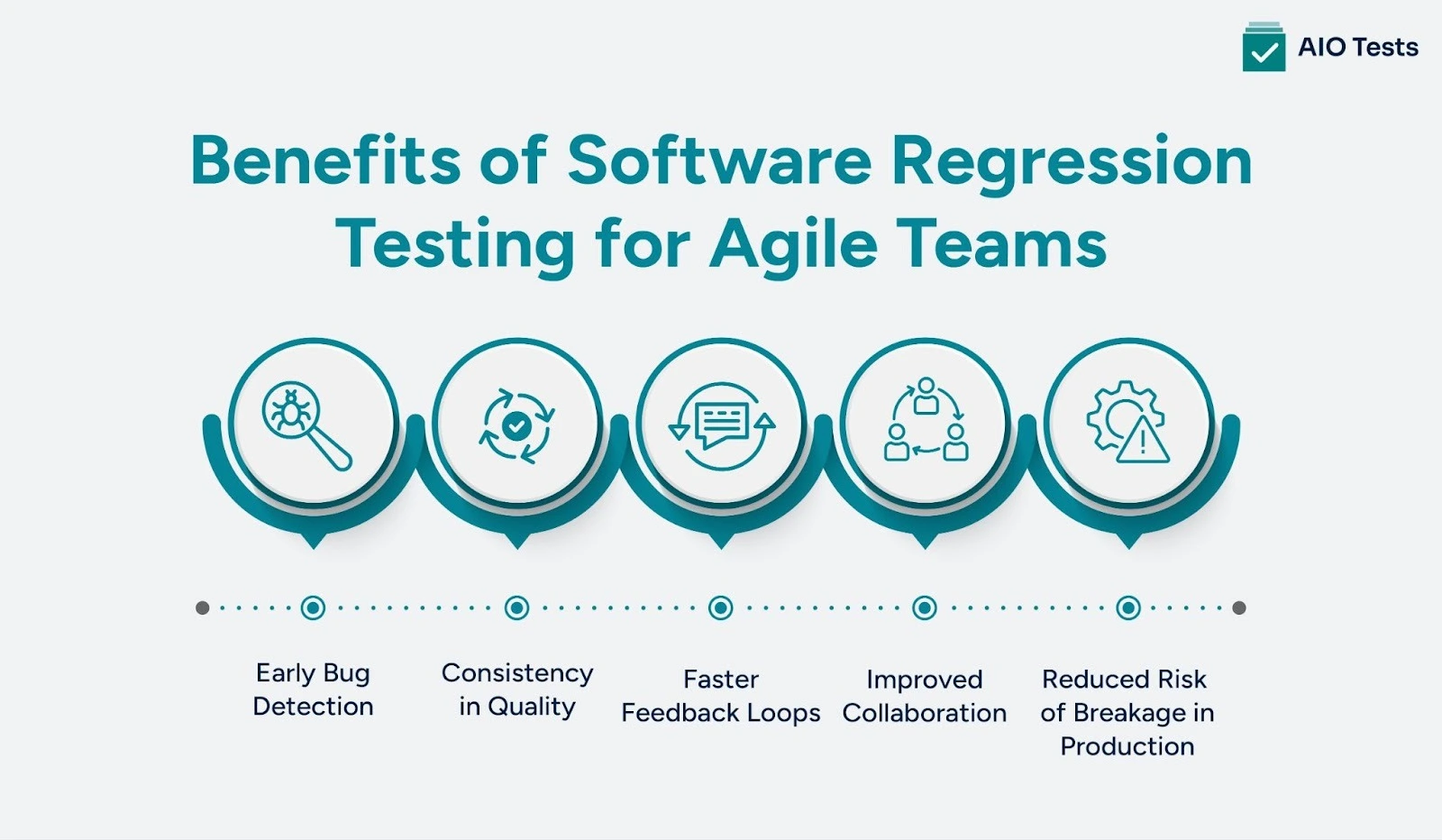Quick Summary
Get a clear view of why software regression testing is the backbone of stability in Agile development. Understand how it protects existing functionality during rapid iterations and keeps every sprint release reliable. See how smart regression testing practices and modern tools help Agile teams move fast without breaking what already works.
In Agile development, the pressure to release features quickly often leaves little room for error. However, speeding through development cycles without proper testing can lead to unexpected issues, especially when new changes break existing functionality.
This is where software regression testing becomes vital. By re-running previously passed tests after every update or new feature, teams ensure that the core functionality remains intact. With Agile emphasizing rapid iterations and continuous integration, regression testing helps maintain a balance between speed and quality.
Without it, new features could introduce bugs that compromise the user experience, affecting everything from performance to security. This makes software regression testing not just a safety net, but a key part of maintaining high-quality software through each release cycle.
What Is Software Regression Testing?
Software regression testing is the practice of running tests to ensure that new code changes haven’t negatively impacted existing functionality.
In an Agile environment, where new code is often added with every sprint, it’s essential to check that the core system remains stable. Without it, changes may introduce unforeseen issues that affect everything from the user experience to system security.
Why Is Software Regression Testing Essential in Agile Environments?
The Agile methodology thrives on delivering software updates frequently. However, with each new release comes the risk that it might impact previous functionalities, a classic challenge in regression testing in agile environments.
Without proper testing, those risks can multiply quickly. Here's why software regression testing is essential in Agile development:
- Frequent Changes and Updates: Agile relies on rapid iterations, which means new features are continuously being added. Regression testing ensures that these new changes don’t interfere with existing features.
- Minimizing the Risk of Bugs: Agile teams move fast, and the likelihood of bugs slipping through increases when testing isn’t thorough. Regression testing helps catch those bugs early and prevent them from escalating into bigger problems.
- Quality Assurance Through Every Sprint: Each sprint in Agile focuses on delivering working software. Regression testing ensures that the software released at the end of the sprint is stable, reliable, and free of new defects introduced by recent changes.
Without regression testing, Agile development runs the risk of producing software that might be fast but ultimately unreliable. As one of the most important types of testing, regression testing ensures that both speed and quality are maintained as your product evolves.”
How Do Agile Teams Benefit from Software Regression Testing?

Software regression testing provides multiple advantages for Agile teams, enabling them to maintain high quality while working in fast-paced, iterative environments. Here are five key benefits:
1. Early Bug Detection
Regression testing helps Agile teams catch defects early, before they escalate into bigger issues. By identifying bugs early in the development cycle, teams can address them before they impact the project’s timeline or escalate into more complex problems.
2. Consistency in Quality
Running regression tests after every update ensures that the functionality of the software remains intact. This consistency helps maintain proper software quality across all sprints and strengthens your overall software quality assurance efforts, even as new features or updates are constantly being introduced.
3. Faster Feedback Loops
Regression testing provides quick feedback on the impact of new code. Agile teams can rapidly determine if recent changes have caused any issues with the existing functionality, allowing them to fix bugs faster and move forward with their development process without delays.
4. Improved Collaboration Between Developers and Testers
Early bug detection through regression testing forces tighter communication between developers and testers. It builds real collaboration early in the cycle, so both teams can jump on issues fast, keep workflows clean, and eliminate bottlenecks.
5. Reduced Risk of Breakage in Production
Continuous regression testing reduces the chances of breaking features that have already been tested and verified. This proactive approach ensures that new releases don’t inadvertently disrupt the user experience or cause significant functionality issues, keeping the product stable and reliable.
How Do Software Regression Testing Tools Help Agile Teams?
Software regression testing tools play a critical role in streamlining the testing process, helping teams keep up with the fast-paced nature of Agile.
Here's how these regression testing platforms can make a significant difference:
But not all tools are created equal.
Some platforms make it easier to manage test cases inside your workflow. Others simplify automation or improve visibility. Here are three standout options that help manage everything from test creation to execution and reporting:
1. AIO Tests – Seamlessly Integrates with Jira for Agile Workflows

If your team relies on Jira for Agile project management, AIO Tests perfectly complements it as a robust regression testing tool.
The tool integrates directly with Jira, making it easier to manage both manual and automated tests while maintaining full traceability. AIO Tests simplifies the management of regression tests by offering AI-powered features that generate and update test cases based on UI changes, thereby reducing the manual effort typically required for writing test cases.
Why It’s Great for Regression Testing: AIO Tests offers organized test execution with features like test cycles, so teams can plan and execute regression tests systematically. By maintaining consistent test case management, AIO Tests ensures that your tests remain up-to-date and aligned with Agile iterations.
Key Features:
- AI-Powered Test Case Generation: AI-powered test case generation automatically updates test cases to reflect UI changes, enhancing the efficiency of your testing process and reducing manual maintenance work.
- Jira Integration: A unified platform that allows test cases and defects to be tracked directly in Jira, giving teams the visibility they need without bouncing between QA tools.
- Comprehensive Reporting: Offers 20+ essential testing reports to analyze defect trends, coverage, and execution progress, helping teams identify bottlenecks and optimize test coverage.

2. Katalon Studio – Powerful Automation with Minimal Coding

Katalon Studio stands out as a user-friendly automation testing tool. Whether you're testing web, mobile, API, or desktop applications, Katalon supports them all. The tool is especially valuable for teams that need automated regression tests but don’t want to deal with the complexity of writing long scripts.
Why It’s Great for Regression Testing: With Katalon’s self-healing capabilities, your automated regression tests remain reliable and effective even when your application undergoes frequent changes. This tool allows teams to quickly adapt their tests without having to rewrite them, which is ideal for automated regression testing in Agile projects.
Key Features:
- Low-Code Test Creation: Ideal for testers of all skill levels, with a low-code environment that reduces the need for manual scripting.
- Self-Healing Tests: Automatically adjusts test scripts when UI changes are detected, reducing manual intervention and maintaining test stability.
- Seamless CI/CD Integration: Supports seamless integration with Jenkins, Git, and other CI/CD tools, enabling continuous testing throughout the development cycle.
3. TestRail – Comprehensive Test Management for Scalable Teams

If you’re managing large regression test suites and need a structured approach to tracking test progress, TestRail is an excellent choice. TestRail excels in test management, helping teams organize, execute, and track tests with ease. It integrates with popular defect-tracking systems like Jira, making it a great fit for teams already using those tools.
Why It’s Great for Regression Testing: TestRail is a test management tool for regression test management because it allows you to target specific tests based on updated functionality. It provides clear visibility into the status of regression tests, making it easier for teams to track test execution and address issues quickly.
Key Features:
- Comprehensive Test Suite Management: Organize test cases into structured sections to improve planning and execution.
- Customizable Dashboards: Keep track of regression test progress in real-time with dashboards that update live, providing visibility to all stakeholders.
- Advanced Reporting: Generate detailed reports, including defect trends, execution progress, and test comparisons, to inform decision-making.
Conclusion
In Agile development, software regression testing is essential to maintain quality as new features are added. Without it, changes can unintentionally affect existing functionality, leading to bugs that disrupt the user experience.
To improve your testing process, consider using AIO Tests, which offers tools to manage both automated and manual regression tests effectively. With features like easy test case management and detailed QA reporting, AIO Tests can help streamline your workflow and improve product quality.
Book a demo with AIO Tests to see how our solutions can optimize your regression testing process and support your Agile development cycle.

FAQs
- What is the difference between regression testing and other types of testing?
Regression testing specifically focuses on ensuring that new code changes don’t negatively affect the existing functionality of the software. Unlike unit or integration testing, which checks individual components or interactions, software regression testing ensures that updates or new features maintain the stability of the entire application.
- How often should regression testing be done in Agile environments?
In Agile development, software regression testing should be performed after every sprint or whenever new features are integrated. Since Agile relies on frequent releases, continuous regression testing is necessary to ensure that newly developed features don’t disrupt existing functionality.
- What are the common challenges of software regression testing in Agile teams?
Agile teams face challenges such as balancing speed and quality, managing increasing test suites, and maintaining consistent testing across different environments. Regression testing tools can help address these issues by automating tests, reducing manual effort, and ensuring thorough coverage.
- How can AIO Tests help streamline my regression testing process?
AIO Tests offers features such as AI-driven test case generation, Jira integration, and comprehensive reporting, making it easier to manage both manual and automated software regression testing. By simplifying test execution and reporting, AIO Tests helps Agile teams stay on track with faster, more efficient regression testing.








.svg)
